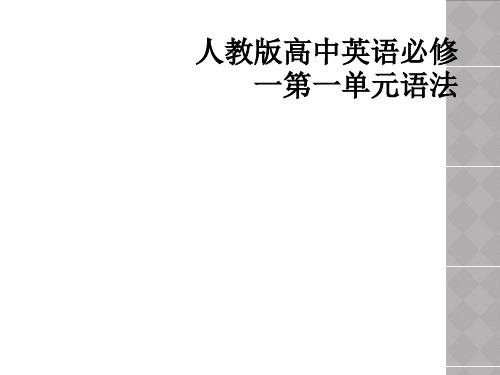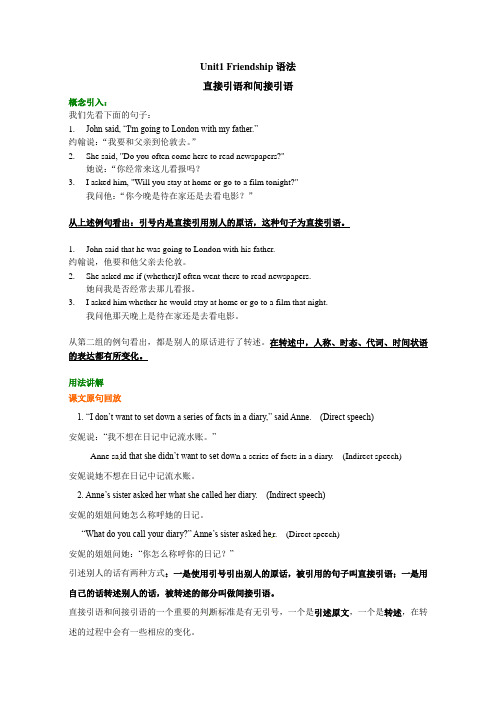高一第一单元直接间接
人教版高中英语必修一第一单元语法课件(grammar直接引语与间接引语 17张ppt)

Exercise
Ⅰ单项选择 1. He asked _______ for the computer. A. did I pay how much B. I paid how much C. how much did I pay D. how much I paid
2. “Have you seen the film?” he asked me. →He asked me _______. A. had I seen the film B. have I seen the film C. if I have seen the film D. whether I had seen the film
f.一般将来时→过去将来时 eg. Tina said, "He will go to see his friend." →Tina said he would go to see his friend. 注:在以下几种情况下,直接引语变为间接引语时,时态一般不变化: ①直接引语是客观真理 eg. He said, "Light travels much faster than sound." →He said light travels much faster than sound. ②直接引语是一般现在时,表示一种反复出现或习惯性的动作 eg. He said, "I get up at six every morning." →He said he gets up at six every morning. ③直接引语中的情态动词没有过去式(ought to/had better/used to...)或 者已经是过去式(could/should/would/might...) eg. Peter said, "You had better come here today." → Peter said I had better come there that day.
人教版高中英语必修一第一单元语法

注意
▪ 主从复合句的直接引语变为间接引语时, 从句中的一般过去时通常不变为过去完成 时。
人称变化
直接 引语 代词
I we you me us this these
间接
引语 he/ they I him/ them that those
代词 she
her
He said,“I like it very much.”
He said that he liked it very much.
He said to me,“I’ve left my book in your room.”
He told me that he had left his book in my room.
直接引语中的状语
状 语
now
变 ago
一般过去时 过去进行时 过去完成时 过去将来时 过去完成进行时 过去完成时
直接引语变间接引语时态不变的情况
✓当直接引语是客观真理时。
✓当直接引语中有具体的过去某年、某月、某日作状 语时。 ✓当直接引语是过去完成时态时。 ✓当主句谓语动词是一般现在时、现在完成时、一般 将来时态时。
✓当直接引语表示的是谚语或名人名言时。
✓当直接引语表示客观的时刻表时。
He said, “The earth goes around the sun.”
He said that the earth goes around the sun.
Mr. Wang said, “I was born in China in September,1972. ”
She said that she would finish her work the next day.
人教版高中英语必修一Unit1 直接引语和间接引语 课件

三 不
She said to me ,
引号内的第三人 称在变间引后去人
“ They want to help him”
变 称不变
She told me that they wanted help him.
Practice:
1) He said,“ My brother failed in the exam.” He said ____brother had failed in the exam.
whether.
3. 直接引语是特殊疑问句变为间接引语的方法
引导词为: 特殊疑问词wh语序: 陈述(即主语在前,谓语在后)
1.“What do you want?” he asked me. He asked me what I wanted.
2. She said, “Where have you been?” She asked me where I had been.
注意:直接引语是客观真理,时态不变。
2. 直接引语是一般疑问句变为间接引语的方法 引导词为: if 或 whether 语序: 陈述(即主语在前,谓语在后) (1). He said, “Do you like the film?” He asked if/whether I liked the film. (2). He said to me, “Will you be free?”
She said she would see me the next week.
SUMMARY
直接引语是陈述句,变为间接引语时
用连词that引导宾语从句.从句中的人
称、时态、时间状语等相应变化.
1)人称的变化 一随主,二随宾,三不变
高一必修1 unit 1 Grammar(direct and indirect speech)

5. “Are you very hot with so many clothes on?” Mother asked her. 6. " What else did you hide under your overcoat?” Margot asked her. 7. “When will we go back home?" Anne asked her father. 8. “Why did you talk so much to this boy?" Father asked Anne.
1. The boy said: “I will be a pilot.” The boy said that he ________ would be a pilot.”
2. Tom said, “We are listening to music.”
Tom said that they ______________ were listening tomusic. Mike said he ___________ had finished his homework.
→ The teacher said she ________ was born in 1973.
状语、指示代词和动词的变化:
直接引语变间接引语,状语、指示代词和动词的 变化规律如下: 时间状语: today that day now
then that week/month /…
this week/month/… yesterday last week
③直接引语中有具体的过去某年、某月、 某日作状语,变为间接引语时,从句时态 不变 。 Jack said, "I was born on April 2l, 1980."
高中英语必修1:Unit 1 直接引语和间接引语

Unit one FriendshipDirect speech and indirect speech(直接引语和间接引语)一.基本概念I直接引语变为间接引语1)、直接引语为陈述句2)、直接引语为祈使句3)、直接引语为疑问句4)、直接引语为感叹句II1、直接引语和间接引语都属于宾语从句2、直接引语和间接引语的概念(1)直接引语:一字不改地引述别人的话(2)间接引语:用说话人自己的话转述别人的话二.变换类型1.直接引语为陈述句直接引语为陈述句,用that引导(口语中可以省略)。
引述动词有:say, tell等。
陈述句变间接引语要注意:1、人称的变化2、指示代词、时间状语、地点状语和动词的变化3、时态的变化4、人称的变化。
一般的规则:一随主,二随宾,三不变例如:The teacher said, “John, you must bring your book to the class. ”1> 第三者说:The teacher told John that he must bring his book to the class.2> 别人对约翰说:The teacher said that you must bring your book to the class.3> 约翰自己说:The teacher said that I must bring my book to the class.I指示代词、时间状语、地点状语和动词的变化1〉指示代词的变化this---- that these----those2〉时间状语的变化now---- then ago---- before today----that day yesterday----the day before; theprevious day tomorrow----the next day; the following day the day beforeyesterday----two days before the day after tomorrow----two days later nextweek/month, etc.----the next week/month, etc. last week/month, etc.----theweek/month before3〉地点状语的变化here----there4〉动词的变化come----go注:在当地转述时,here不变为there,come不变为go.在当天转述时,yesterday, tomorrow等时间状语也不变。
必修一unit1直接引语和间接引语

Unit1 Friendship语法直接引语和间接引语概念引入:我们先看下面的句子:1.John said, “I'm going to London with my father.”约翰说:“我要和父亲到伦敦去。
”2.She said, "Do you often come here to read newspapers?"她说:“你经常来这儿看报吗?3.I asked him, "Will you stay at home or go to a film tonight?"我问他:“你今晚是待在家还是去看电影?”从上述例句看出:引号内是直接引用别人的原话,这种句子为直接引语。
1.John said that he was going to London with his father.约翰说,他要和他父亲去伦敦。
2.She asked me if (whether)I often went there to read newspapers.她问我是否经常去那儿看报。
3.I asked him whether he would stay at home or go to a film that night.我问他那天晚上是待在家还是去看电影。
从第二组的例句看出,都是别人的原话进行了转述。
在转述中,人称、时态、代词、时间状语的表达都有所变化。
用法讲解课文原句回放1. “I don’t want to set down a series of facts in a diary,” said Anne. (Direct speech)安妮说:“我不想在日记中记流水账。
”Anne sa id that she didn’t want to set dow n a series of facts in a diary. (Indirect speech)安妮说她不想在日记中记流水账。
人教版高一英语必修一第一单元知识点

英语必修一第一单元知识点一、语法Direct and Indirect Speech(1)直接引语和间接引语1.直接引语在改为间接引语时,时态需要做相应的调整。
eg: "I broke your CD player."(一般过去时改成过去完成时)He told me he had broken my CD player.Jenny said,"I have lost a book."(现在完成时改成过去完成时)Jenny said she had lost a book.Mum said,"I’ll go to see a friend."(一般将来时改成过去将来时)Mum said she would go to see a friend.He said,"We hadn't finished our homework."(过去完成时保留原有的时态)He said they hadn't finished their homework.注意:直接引语是客观真理,过去进行时,时态不变。
2.在直接引语变间接引语时,如果从句中的主语时第一人称或被第一人称所修饰,从句中的人称要按照主句中主语的人称变化。
如:Mary said,"My brother is an engineer."Mary said her brother was and engineer.3.直接引语如果是反意疑问句,选择疑问句或一般疑问句,间接引语应改为由whether或if引导的宾语从句。
如:He said,"Can you run, Mike?"He asked Mike whether/if he could run.4.直接引语如果是祈使句,间接引语应改为“tell(ask, order, beg等) sb (not) to do sth”句型。
高一英语UNit1直接引语和间接引语课件人教课标必修1

Goodbye!
9、静夜四无邻,荒居旧业贫。。*** 10、雨中黄叶树,灯下白头人。。**** 11、以我独沈久,愧君相见频。。***** 12、故人江海别,几度隔山川。。**** 13、乍见翻疑梦,相悲各问年。。***** 14、他乡生白发,旧国见青山。。**** 15、比不了得就不比,得不到的就不要。。。***** 16、行动出成果,工作出财富。。*** 17、做前,能够环视四周;做时,你只能或者最好沿着以脚为起点的射线向前。。**** 9、没有失败,只有暂时停止成功!。*** 10、很多事情努力了未必有结果,但是不努力却什么改变也没有。。**** 11、成功就是日复一日那一点点小小努力的积累。。***** 12、世间成事,不求其绝对圆满,留一份不足,可得无限完美。。**** 13、不知香积寺,数里入云峰。。***** 14、意志坚强的人能把世界放在手中像泥块一样任意揉捏。**** 15、楚塞三湘接,荆门九派通。。。***** 16、少年十五二十时,步行夺得胡马骑。。*** 17、空山新雨后,天气晚来秋。。**** 9、杨柳散和风,青山澹吾虑。。*** 10、阅读一切好书如同和过去最杰出的人谈话。**** 11、越是没有本领的就越加自命不凡。***** 12、越是无能的人,越喜欢挑剔别人的错儿。**** 13、知人者智,自知者明。胜人者有力,自胜者强。***** 14、意志坚强的人能把世界放在手中像泥块一样任意揉捏。**** 15、最具挑战性的挑战莫过于提升自我。。***** 16、业余生活要有意义,不要越轨。*** 17、一个人即使已登上顶峰,也仍要自强不息。****
- 1、下载文档前请自行甄别文档内容的完整性,平台不提供额外的编辑、内容补充、找答案等附加服务。
- 2、"仅部分预览"的文档,不可在线预览部分如存在完整性等问题,可反馈申请退款(可完整预览的文档不适用该条件!)。
- 3、如文档侵犯您的权益,请联系客服反馈,我们会尽快为您处理(人工客服工作时间:9:00-18:30)。
直接引语变间接引语练习题1. He asked ________ for the computer.A. did I pay how muchB. I paid how muchC. how much did I payD. how much I paid2. “Have you seen the film?” he asked me. →He asked me _______.A. had I seen the filmB. have I seen the filmC. if I have seen the filmD. whether I had seen the film3. “Please close the window,” he said to me.→He ______ me _____ the window.A. said to; to closeB. told to; closingC. asked ; to closeD. said to; please close4. “I am a teacher,” Jack said. →He said _________.A. that I am a teacherB. I was a teacherC. that he is a teacherD. he was a teacher5. He said, “Mother, the boy is very naughty.” →He _____- very naughty.A. said his mother that the boy wasB. said to his mother that the boy isC. told his mother that the boy wasD. spoke to his mother that the boy was6. “You’ve already got well, haven’t you?” she asked.→She asked ________.A. if I have already got well, hadn’t youB. whether I had already got wellC. have I already got wellD. had I already got well.7. He asked , “ Are you a Party member or a League member?”→He asked me _________.A. am I a Party member or a League memberB. was I a Party member or a League memberC. if I was a Party member or a League memberD. whether was I a Party member or a League member.8. He asked, “How are you getting along?” →He asked _______.A. how am I getting alongB. how are you getting alongC. how I was getting alongD. how was I getting along9. He asked me ________ with me.A. what the matter isB. what the mater wasC. what’s the matterD. what was the matter10. He said, “Don’t do that again.” He _____ me _______ that ag ain.A. said to me; not to doB. said to me; don’t doC. told me; don’t doD. told me; not to do11 The girls asked if they ____ some food and drink with them.A. tookB. takeC. takesD. will take1 2 Catherine said that she ___to Guangzhou.A. has never goneB. had never goneC. has never beenD. had never been13The students want to know whether they___ dictation today.A. hadB. has .C. will haveD. are1 4 She asked Linda if___ go and get some.A. could sheB. she couldC. she canD. she may1 5 Linda said the moon___ round the earth.A. travelledB. has travelledC. travellsD. had t ravelled 16 Can you tell me___ you were born, Betty?A. whoB. whatC. whenD. that17 I don't know ___ they have passed the exam.A. whatB. ifC. whenD. where18.I hardly understand.___ he has told me.A. thatB. whatC. whichD. who19 She didn't know___ back soon.A. whether he would beB. if would he beC. he will beD. whether would he be20 I don't know ____ he still lives here after so many years.A. whether B where C. what D.when21 Do you know _____ they listened to yesterday evening?A. what B when C why D how22 He asked me _____told me the accident.A whomB whichC whoD whose23.They don't know ______their parents are.A thatB whatC whyD which24.Please tell me ______ last year.A.where does your sister work B where did your sis ter workC. where your sister works D where your sister worked25.She asked me if I knew ______.A.whose pen is itB. whose pen it wasC.whose pen it isD.whose pen was it26. You must remember ________.A. what your mother saidB. what did your mother sayC. your mother said whatD. what has your mother said27 Did you know ____?A. who he was looking afterB. who was he looking forC. who he is looking forD. who he is looking af ter28 Could you tell me ___?A. when will they leave BeijingB. when would they leave BeijingC. when they will leave BeijingD. when did they leave Beijing29 The teacher said to me, “Have you finished you r homework?”A. The teacher asked me whether I have finished my homework.B. The teacher asked me whether I finished my home work.C. The teacher asked me whether had I finished my homework.D. The teacher asked me whether I had finished my homework.30. She said to her son,“Don’t play in the street.”A. She said to her son that he didn’t play in the street.B. She told to her son not to play in the street.C. She told her son that he didn’t play ion the street.D. She told her son not to play in the street.31. He asked _____.A. where is the railway station.B. where the railway station isC. where was the railway stationD. where the railway station was32. The inspector said, “This machine is the worst I”ve ever seen.”A. The inspector said that machine was the worst I’d ever seen.B. The inspector said that machine was the worst I’ve ever seen.C. The inspector said that machine was the worst he ever saw.D. The inspector said that that machine was the worst he had ever seen.5. She told me this morning _____.A. how had the accident happenedB. how did the accident happenedC. how happened the accidentD. how the accident had happened6. The policeman asked him _____.A. what was his nameB. what his name wasC. which was his nameD. who was his name7. He told us he _____ a concert _____ .A. had attended ... three days beforeB. attended ... three days agoC. would attend ... since three daysD. was attending ... for three days8. The policeman asked him _____ .A. what was his number plateB. what his number plate wasC. how much his number plate wasD. how many his number plate was9. The biology teacher said“The leaves come out in spring.”A. The biology teacher said that the leaves come o ut in spring.B. The biology teacher said that the leaves came o ut in spring.C. The biology teacher said that the leaves would come out in spring.D. The biology teacher said that the leaves should come out in spring.10. He asked me _____.A. whether I knew where his brother has goneB. if I knew where his brother had goneC. that I knew where his brother had goneD. whether I knew where his brother went11. I wondered _____ to come to the party.A. should he been askedB. if he is askedC. if he should have been askedD. if he should asked12. He asked me how _____ my research work.A. I’m getting on withB. am I getting on withC. I was getting along withD. I were getting along with13. Do you know _____?A. what the population of China isB. how much is the population of ChinaC. what is the population of ChinaD. how many the population of china is14. I wonder _____.A. how much these shoes costB. how much cost these shoesC. how much do these shoes costD. how much are these shoes cost15. The teacher asked, “Where are you going, John?”A. The teacher asked where was John going?B. The teacher asked him where John was going.C. The teacher asked John where he was going.D. The teacher asked John where he went.16. “My sister is coming here with us tonight.”Ann said.A. Ann said that her sister is coming here with u s tonight.B. Ann said that her sister was coming here with them tonight.C. Ann said that her sister was coming there that night.D. Ann said that her sister was going there with them that night.17. The servant asked, “Is there anything else I can do?”A. The servant asked was there anything else he ca n do.B. The servant asked there was anything else he co uld do.C. The servant asked if there is anything else he could do.D. The servant asked whether there was anything else he could do.18. The young policeman told the boys _____ .A. never to play with fireB. not to play the fireC. not to play fireD. don’t play with the fire。
